 In 2021 we were introduced to the Imperium deck building collection. Designed by Nigel Buckle and David Turczi, and published by Osprey Games, the initial release featured two separate sets with distinct civilizations that could be pitted against each other for glory. Not really a battler, but more like a “who can get their engine going best” sort of affair.
In 2021 we were introduced to the Imperium deck building collection. Designed by Nigel Buckle and David Turczi, and published by Osprey Games, the initial release featured two separate sets with distinct civilizations that could be pitted against each other for glory. Not really a battler, but more like a “who can get their engine going best” sort of affair.
I’ve played a lot of the original two sets, Classics and Legends, as they both feature cross play and a well-considered solo bot system. But with as much as I got them to the table, there was always something missing to truly take the game to the next level. Plus, there were minor issues in the set that needed to be fixed.
Enter 2024 and a brand-new inclusion to the series—Imperium: Horizons. The designers return with 14 (!!) new civilizations, a new trading mechanism, and balance adjustments for the base collections. All featuring the same distinctive illustration from artist Mihajlo Dimitrievski. Let’s sleeve some cards and see what all the buzz is about.
Gameplay Overview:
In the Imperium system, players choose a unique civilization deck that is drawn, discarded, and powered up over the course of the game. Players can acquire cards from a market with a variety of suits, including land regions, uncivilized and civilized abilities, and tributary cards which feature other nations ready to assist in your development. There is also an unrest card type that clogs up your hand and must be dealt with before that deck is emptied, thus causing a collapse, and triggering end game prematurely (for most civs).
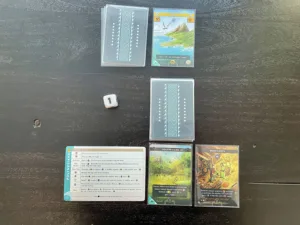
There are a lot of rules waiting to be discovered within the deck building of this series. A basic turn sees players draw five cards from their main deck. Their civilization may have a nation deck that provides more powers over time with one card being added each time you reshuffle. Once the nation deck reaches a specific ascension card, this may trigger your civilization to move from a barbarian state into an empire state, allowing players access to new cards and powers to develop. Players get three actions and some “exhaust” free actions during that turn.
With that incredibly brief intro out of the way, let’s dig into this new entry. Horizons provides 14 more civilizations to add to the fray. Some feel familiar (Mayans), whereas others like the Martians or the Cultists feel like they’d fit right in with the Legends release that featured Utopians and Atlanteans. Almost all civilizations are unique and take time to learn how to progress their decks efficiently.
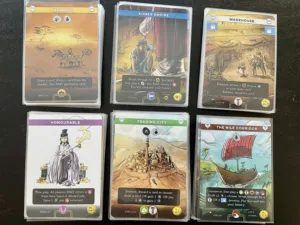
Horizons adds a new system to consider when playing solo or against friends (the game plays from one to four players). The Trade Routes expansion allows players to acquire new cards that feature ways to interact with cards using a new resource called “goods.” Once a player has added a trade card to their active tableau, they can activate a new-to-this-release Merchant card to trade a goods resource and activate a Commerce ability on the card. Opponents can also use other players trade routes by giving them a goods resource and gaining one for themselves. Once a trade route has three goods, players can use the route’s Profit action, gaining all the goods and a special bonus power on the card.
Beyond this new expansion module, Horizons also features 49 cards that are replacements for cards in the original sets. These replacements provide balance fixes as well as integrate the trade route mechanism into several of the civilizations from 2021. Another nice addition here is the inclusion of solo bot cards that can be placed on the table to reference. In the original sets, players would have to use the rulebook as the reference guide, which wasn’t ideal.
One final mention with the new release is the rulebook. Horizons features a comprehensive rulebook that covers all three sets of Imperium games. It has all civilizations considered and does a much better job of explaining the rules than the original rulebooks.
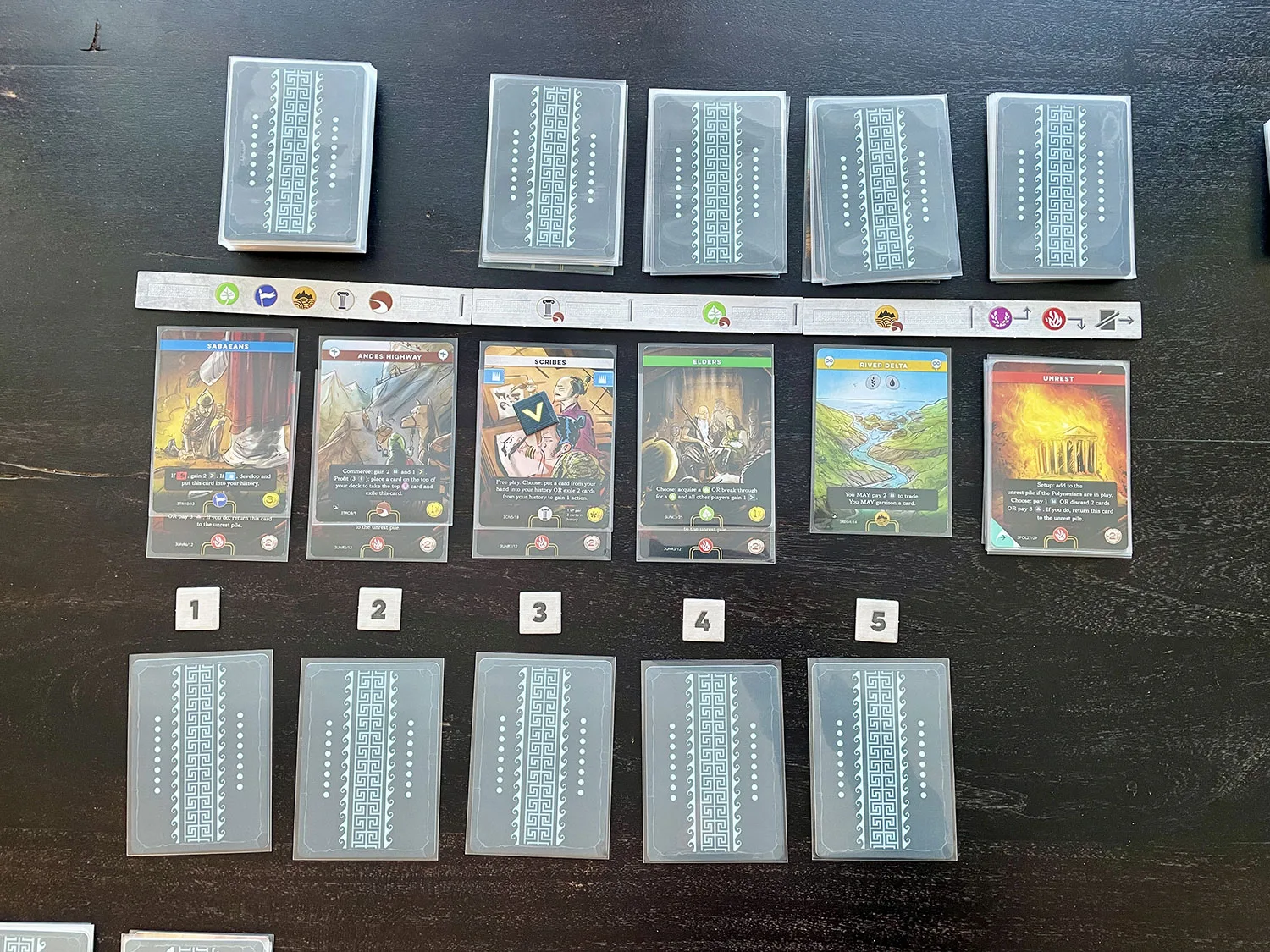
Game Experience:
“How are the new civilizations?”
I’ve seen all civilizations on the table through solo plays and have found some favorites that exist in this box. I’ve enjoyed the Tang for their unrest navigation, the Guptas for their trading prowess, the Polynesians for their journey across the ocean, and even the Taino for how they juggle resources to power cards. I think my favorite in the set is the Inuits. They feature a special state card that switches each round between summer and winter. Their puzzle is great to tackle.
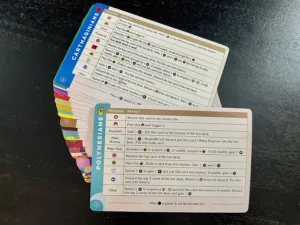
Out of the more outlandish civilizations, I’m much more a fan of playing the Cultists over the Martians. The Cultists have a unique and specific approach to the game, almost like a questing system, as they attempt to summon an elder god into existence. The Martians have been quite hard to grasp in my early plays, though I’ve had a blast playing against them as the bot. Their tactics include adding “gadgets” to the market via a swap mechanism that allows you to use their Martian tech in your ancient civilization. Super fun idea and executed well.
There are a couple civilizations that do feel a little close to earlier released options, like how the Mayans use masks and the Tang have similar cards to the Qin. There are still plenty of cards in their decks to distinguish them as their own civilization though, and the thought and attention that’s gone into giving each of them their own flavor and historical accuracies is excellent.
“How is the new trade module?”
The trade route cards are added to the bottom of each small market deck and some additional cards are shuffled into the main deck. If one is available in the market when it’s your turn, you can use your Market card to acquire a route (with a corresponding unrest) to add it to your hand. It’s wonderful how a small batch of cards can provide such a boost of energy to the system. There is also an extra fame card specific to the trade routes expansion that gets added to that deck.
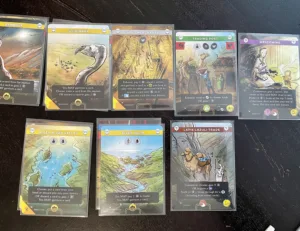
I’ve heard a lot of rumblings from folks that the trade module adds more complexity to the game, but I don’t find this to be true. In fact, I prefer the trade routes option now in my plays as it requires the removal of the sword icon cards that are more take-that in nature, swapping them out with cards that promote the trade system. And the flow of the game changes as acquiring these cards is important to boost your engine. Some of the new civilizations are specific to this module and it must be included when playing with them. And the solo bot has its own trade route table that incorporates it smoothly into solo plays.
Beyond the redundant civilizations, the biggest issue with this release is mostly an ongoing quibble. Horizons features cards that fix issues from the Classics/Legends releases, but now it adds new errata issues to the new set. These are not game breaking in any way, but as someone whose edited countless bodies of work, there are some easy-to-spot oversights that just needed a more thorough review. The designers are working hard to point these out in the BGG forums for anyone interested. On a side note, Osprey Games, I’m ready to help you out anytime. Just reach out using my trade route.
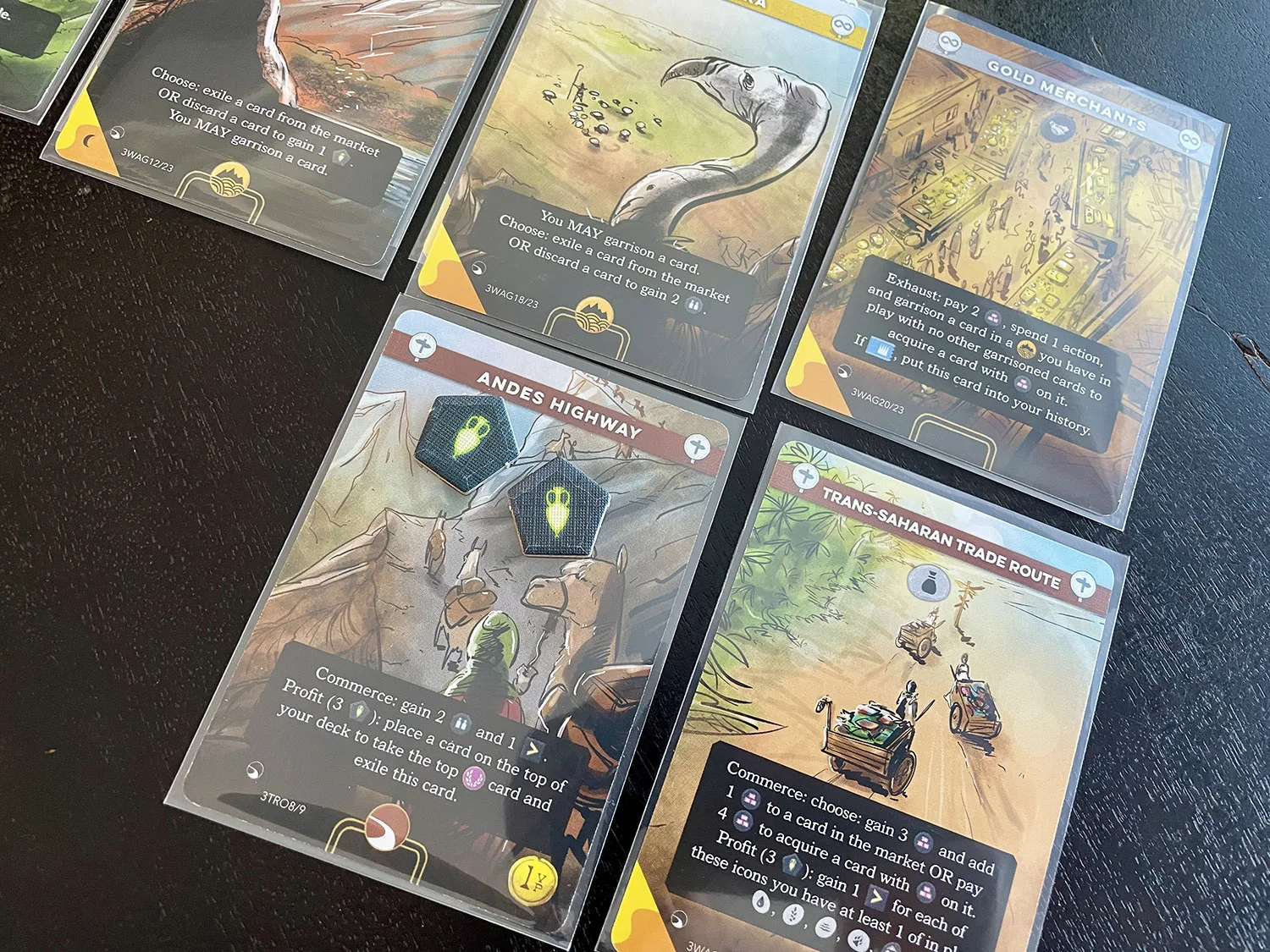
Final Thoughts:
In the end, I’m all-in on this addition to the series. Imperium now has three boxes featuring 30 civilizations. I’d already had this as a mainstay solo gaming experience, and this adds so much value to the game. I do also enjoy Imperium at two players and thankfully Horizons also includes an official short variant that decreases playtime by adjusting deck size and discards. Excited for this inclusion. It allows me to get more civilization matchups out on the table. I’m already trying to decide on which to include in my next adventure. What are some of your favorite civilizations in the Horizons release
Final Score: 4.5 stars – The Imperium series rewards its fans with new civilizations and much needed improvements.
 Hits:
Hits:
• New unique civilizations
• Solo bot state cards
• Trade route interactions
• Updates for Classics/Legends
Misses:
• More errata woes
• A couple redundant civilizations























As someone who hasn’t played any of the Imperium series, would you recommend this as a good jumping in point?
Absolutely! It has a great range of civilizations to play, has all the rules consolidated, and includes the trade route. If you enjoy, add the other options when you tire of the new civs.